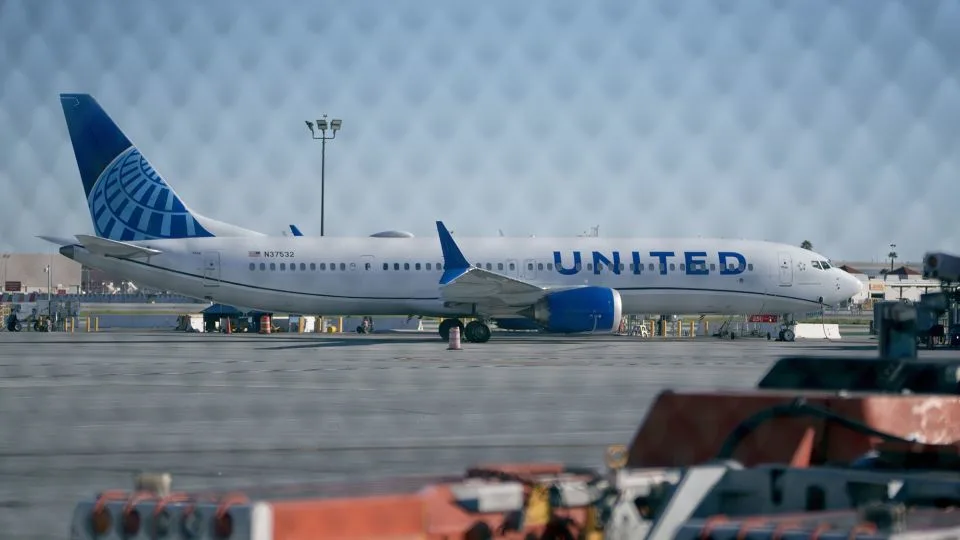United Airlines, one of the biggest buyers of Boeing jets, is losing patience with the troubled aircraft maker.
“I’m disappointed that… this keeps happening at Boeing. This isn’t new,” said Scott Kirby, CEO of United, in an interview Tuesday on CNBC. “We need Boeing to succeed. But they’ve been having these consistent manufacturing challenges. They need to take action here.”
Kirby made his comments after the airline warned investors that it will report a larger-than-expected loss in the first three months of this year because of the grounding of all 737 Max 9 jets after a door plug blew off on an Alaska Air flight on January 5, leaving a massive hole in the side of the plane.
The plane landed without any serious injuries, but the Federal Aviation Administration ordered the grounding and additional inspections of the more than 200 jets of that model worldwide.
United Airlines said it now expects its fleet of Boeing Max 9 jets to remain grounded through the end of this month, and that the company will report a first quarter loss in the range of $116 million to $262 million. That’s more than the $138 million loss already forecast by analysts surveyed by Refinitiv.
United has 79 of the Max 9s, more than any other airline, and had originally scheduled nearly 8,000 flights with the plane for this month before the incident, according to Cirium, an aviation analytics firm.
Beyond the current 737 Max 9 problem is what this means for Boeing’s orders for the 737 Max 10, a newer, larger version and more expensive version of the 737 Max that has yet to be certified by the FAA. It will be at least five years in a best case scenario before Boeing can delivery those Max 10 jets to United, Kirby said, and the airline is now no longer counting on getting that plane in the future.
“I think the Max 9 grounding is probably the straw that broke the camel’s back for us,” said Kirby. “We’re going to build a plan that doesn’t have the Max 10 in it.”
United has firm orders for 277 of the 737 Max 10, and options to buy an additional 200, and so if the airline were to pull out of those orders, it would be a massive blow for Boeing’s efforts to bring that plane to market.
And in a call with investors later in the day, Kirby said that the airline is not quite canceling the orders that it has for the Max 10, but it doesn’t anticipate it’ll be receiving the jets, either.
“We are taking it out of our internal plans,” said Kirby. “And we’ll be working on what that means exactly with Boeing. But Boeing is not going to be able to meet their contractual deliveries on at least many of those airplanes. And let’s leave it at that.”
United has orders for more than 500 Boeing jets in total on the books, more than twice as many as it does for jets from its rival Airbus. But in the last six months, United took delivery of its first A321neo, a model that directly competes with the Boeing 737 Max.
But thanks to a deep order backlog at both companies, even if United were to drop its 737 Max 10 purchase plans, it would probably be forced to buy other 737 Max models rather than getting at the end of the line for buyers of Airbus jets.
That will constrain the company for quite some time, Kirby added.
“We’re still going to be the fastest growing airline,” Kirby said. “But we’re not going to be as fast growing as we planned.”
Boeing would not comment directly on United’s comments on its orders, other than to once again apologize for the problems that led to the incident at Alaska Air and the subsequent 737 Max 9 grounding.
“We have let down our airline customers and are deeply sorry for the significant disruption to them, their employees and their passengers,” said Stan Deal, head of Boeing’s commercial aircraft unit, in a statement released by the company. “We are taking action on a comprehensive plan to bring these airplanes safely back to service and to improve our quality and delivery performance. We will follow the lead of the FAA and support our customers every step of the way.”
Boeing has had a series of quality issues that have dogged the aircraft maker for the last five years, ever since two fatal crashes of the 737 Max 8 in late 2018 and early 2019 led to a 20-month grounding of the jet.
United believes it is getting close to the completion of the inspections it needs to get approval to fly the 737 Max 9 once again, Kirby said.
“I have a lot of confidence in the safety of these airplanes, particularly since we know what happened with this Max 9,” he said. “I think we’re near the end game of getting that [model] back flying.”
United did say it expects full year earnings of between $9 to $11 a share, a range which would include the current estimates of full-year earnings of $9.45 a share according to analysts, as well as 2023 earnings of $10.05 a share that it reported Monday.
And it reported fourth-quarter earnings of $2.00 a share, topping the $1.69 a share forecast by analysts.
The earnings beat and the full-year guidance helped to lift shares of United more than 5% in trading Tuesday.

